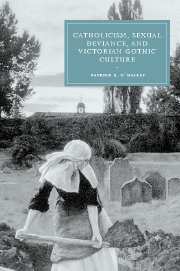Book contents
- Frontmatter
- Contents
- List of illustrations
- Acknowledgments
- Introduction: skeletons in the cloister
- 1 Goths and Romans: the literature of Gothic from Radcliffe to Ruskin
- 2 “The Church's closet”: Victorian Catholicism and the crisis of interpretation
- 3 Domestic Gothic: unveiling Lady Audley's Secret
- 4 The blood of the saints: vampirism from Polidori to Stoker
- 5 “Monstrous and terrible delight”: the aesthetic Gothic of Pater and Wilde
- 6 Conclusions: Oxford's ghosts and the end of the Gothic
- Notes
- Works cited
- Index
- CAMBRIDGE STUDIES IN NINETEENTH-CENTURY LITERATURE AND CULTURE
6 - Conclusions: Oxford's ghosts and the end of the Gothic
Published online by Cambridge University Press: 06 July 2010
- Frontmatter
- Contents
- List of illustrations
- Acknowledgments
- Introduction: skeletons in the cloister
- 1 Goths and Romans: the literature of Gothic from Radcliffe to Ruskin
- 2 “The Church's closet”: Victorian Catholicism and the crisis of interpretation
- 3 Domestic Gothic: unveiling Lady Audley's Secret
- 4 The blood of the saints: vampirism from Polidori to Stoker
- 5 “Monstrous and terrible delight”: the aesthetic Gothic of Pater and Wilde
- 6 Conclusions: Oxford's ghosts and the end of the Gothic
- Notes
- Works cited
- Index
- CAMBRIDGE STUDIES IN NINETEENTH-CENTURY LITERATURE AND CULTURE
Summary
It is not unlikely that an artful priest might endeavour to turn their own arms on the innovators; and might avail himself of his abilities as an author to confirm the populace in their ancient errors and superstitions.
Walpole, “Preface” to the first edition of The Castle of Otranto (1764)[A]n American man of letters, who did not whitewash his own morals, informed me that, having bought a copy of the book on the strength of the shocked criticisms, he read on and on, wondering when the harmfulness was going to begin, and at last flung it across the room with execrations at having been induced by the rascally reviewers to waste a dollar-and-half on what he was pleased to call “a religious and ethical treatise.”
Thomas Hardy, “Postscript” to the Wessex edition of Jude the Obscure (1912)In their conflation of the tropes of sexual transgression, national apostasy, and religious blasphemy, Oscar Wilde's trials produced a sort of Inquisitorial Gothic in England, not as the relic of the past but as the culture of the present. At the same time, as I have argued, those trials put an end to the particular Gothic strains I have been examining, collapsing the fascinating play of religious and sexual deviance into mere homosexuality and rewriting Gothic terror as a mundane and modern “indecency” that could (finally) be safely contained.
- Type
- Chapter
- Information
- Catholicism, Sexual Deviance, and Victorian Gothic Culture , pp. 193 - 216Publisher: Cambridge University PressPrint publication year: 2006



